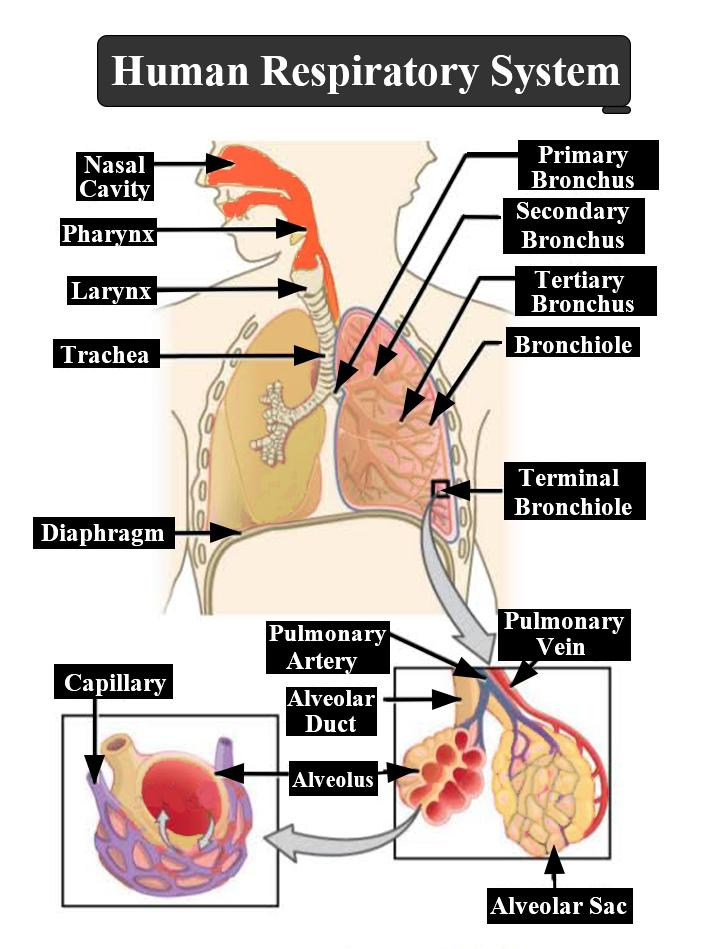
Passage of air through the respiratory tract during inspiration is
a) Nostril – Nasal cavity – Larynx – Pharynx – Bronchi – Trachea – Bronchioles – Alveoli
b) Nostril – Nasal cavity – Pharynx – Larynx – Trachea – Bronchi – Bronchioles – Alveoli
c) Nostril – Nasal cavity – Larynx – Pharynx – Trachea – Bronchi – Bronchioles – Alveoli
d) Nostril – Nasal cavity – Bronchioles – Bronchi – Larynx – Pharynx – Trachea – Alveoli
Answer
566.7k+ views
Hint: The passage through which the diffusion of the oxygen and carbon dioxide takes place in a human body is known as the respiratory tract. Oxygen is inhaled from the atmosphere and the carbon dioxide is exhaled out from the lungs into the atmosphere.
Complete answer:
The respiratory system involves the intake of oxygen and removal of carbon dioxide. Air or oxygen is taken in by the nostrils and then reaches the nasal cavity. It then reaches the pharynx which then transfers it to the larynx. The pharynx is a part of the throat and the larynx is also called a voice box. The air from the voice box is then transferred to the trachea from where it reaches the lungs. The lung’s trachea gets divided into branches which are called bronchi which are further divided into a more branched structure known as bronchioles. At the end of the bronchioles, there is the presence of a sac-like structure which is known as alveoli. This alveolus helps in the diffusion of the air into the blood. It is also known as an air sac. It can expand and contract and has networks of veins and arteries present. the diffusion of oxygen into blood and carbon dioxide from the blood into the air sac takes place here.

So, the answer is ‘Nostril – Nasal cavity – Pharynx – Larynx – Trachea – Bronchi – Bronchioles – Alveoli’.
Note: The respiration starts from the nose and the diffusion of gases takes place in the lungs. The respiratory passage can be divided into the upper respiratory tract and the lower respiratory tract. The upper respiratory tract includes the nasal cavity, pharynx, and larynx. The lower respiratory tract includes the trachea, bronchi, and lungs.
Complete answer:
The respiratory system involves the intake of oxygen and removal of carbon dioxide. Air or oxygen is taken in by the nostrils and then reaches the nasal cavity. It then reaches the pharynx which then transfers it to the larynx. The pharynx is a part of the throat and the larynx is also called a voice box. The air from the voice box is then transferred to the trachea from where it reaches the lungs. The lung’s trachea gets divided into branches which are called bronchi which are further divided into a more branched structure known as bronchioles. At the end of the bronchioles, there is the presence of a sac-like structure which is known as alveoli. This alveolus helps in the diffusion of the air into the blood. It is also known as an air sac. It can expand and contract and has networks of veins and arteries present. the diffusion of oxygen into blood and carbon dioxide from the blood into the air sac takes place here.

So, the answer is ‘Nostril – Nasal cavity – Pharynx – Larynx – Trachea – Bronchi – Bronchioles – Alveoli’.
Note: The respiration starts from the nose and the diffusion of gases takes place in the lungs. The respiratory passage can be divided into the upper respiratory tract and the lower respiratory tract. The upper respiratory tract includes the nasal cavity, pharynx, and larynx. The lower respiratory tract includes the trachea, bronchi, and lungs.
Recently Updated Pages
Master Class 11 Computer Science: Engaging Questions & Answers for Success

Master Class 11 Business Studies: Engaging Questions & Answers for Success

Master Class 11 Economics: Engaging Questions & Answers for Success

Master Class 11 English: Engaging Questions & Answers for Success

Master Class 11 Maths: Engaging Questions & Answers for Success

Master Class 11 Biology: Engaging Questions & Answers for Success

Trending doubts
One Metric ton is equal to kg A 10000 B 1000 C 100 class 11 physics CBSE

There are 720 permutations of the digits 1 2 3 4 5 class 11 maths CBSE

Discuss the various forms of bacteria class 11 biology CBSE

Draw a diagram of a plant cell and label at least eight class 11 biology CBSE

State the laws of reflection of light

Explain zero factorial class 11 maths CBSE




